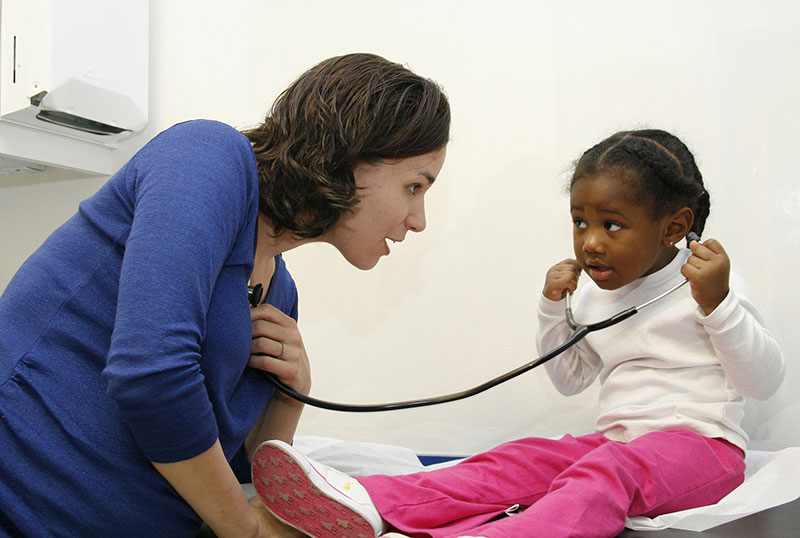Making the choice between pediatrics or family practice
Like many parents with young children, Meredith Hurley is trying to decide between a pediatrician and a family practitioner.
“Originally, we chose a pediatrician because our first daughter was born two months premature and required more medical attention than a family practice could offer her. I’m considering switching to a family practice because of convenience, mainly,” Hurley says. When her kids get sick, she often does too and that means trips to two doctor’s offices.
One of the benefits of a family practice is that everyone can be treated by the same physician. Dr. Meenal Dwyer, a family doctor at Riverside Family Medicine, says that related patients at her practice often schedule appointments together.
Dwyer thinks of her job to provide family care as multi-generational, and Hurley agrees. “Growing up, we had a family physician and looking back, they were able to use our entire family medical history to treat us. Our doctor had a good idea of what was already going on in our family.”
But that same trusting relationship can be built with pediatricians. Dr. Stacey Cummings, from Pediatric Associates of Williamsburg, says she went into pediatrics to “get to know the child and their family, and follow them through the years.” She sees the parents as part of the “care team.”
One of the advantages of seeing a pediatrician is that they know more about developmental stages.
“It’s all we do all day long—we know kids are not little adults. There are different worries for them,” Cummings says. “Kids haven’t seen infectious diseases before, so we see their first colds and their first viruses here.”
Mary Freiman is glad to have a practice that specializes in pediatrics for her daughter Margo, who was born prematurely in 2011. They go to the Children’s Hospital of The King’s Daughters (CHKD) practice in Newport News, Va., for developmental checkups. “I feel like children are different from adults—I look things up in baby books all the time that I wouldn’t for myself. That’s why a pediatrician makes sense for us.
“Our primary care physician deals with retirees most of the time, not babies or pregnant or lactating women. The nurse practitioner is also a lactation consultant, and when I was just starting to nurse Margo and having problems due to her prematurity, she was very supportive. She took the time to watch me breastfeed Margo in her office and give pointers,” Freiman says.
Pediatricians also have experience with the challenging parts of routine health care, like examining the ears of anxious toddlers or drawing blood from babies.
“We try to make it as minimally invasive as possible, and be quick on our feet,” Cummings says.
Each stage of life needs different types of approaches. For example, adolescents are “not slightly smaller adults or slightly bigger kids” but in a completely unique stage. There are specific issues during this period of time, such as the physical changes of puberty, the emergence of psychiatric illnesses, and social and behavioral difficulties. There are also the complicating factors of possible drug and alcohol use, sexual identity and sexual activity. Cummings says that having treated the patient since childhood helps them get through the teenage years because they’ve built up trust with their doctor.
One of the specific benefits of Cummings’ practice is the affiliation with CHKD in Norfolk, Va. With access to more than 35 pediatric specialties, doctors can quickly reach the specialist on call.
But don’t discount the family practice doctor’s ability to offer similar services. Dr. Dwyer has access to specialists as well, and she also received pediatrics training during her residency. Due to the number of different conditions she sees, she can treat common ones on-site without referring to a specialist, but won’t hesitate to refer for a rare or unusual illness.
A thorough interview may be the best way to determine what will work for you and your family. That’s what Stephanie Hasselbacher Berryhill, from Williamsburg, Va., did before her son was born.
“When I found someone I liked for Henry who could also see us, it seemed like the best choice. Because she is also my doctor now, I feel that treating my postpartum and breastfeeding medical issues as a part of Henry’s infant care went extremely smoothly,” she says.
Every doctor is an individual and that may be what makes the decision for parents in the end.
“It was entirely about personality. Perhaps it was just bad luck on my part, but the majority of the pediatric specialists I saw were quick to judge and condescend. I am fully aware that they do in fact know much more than I do about medical care of children! But I knew that such personalities would prevent me from feeling comfortable asking questions, voicing my opinions, or otherwise advocating for myself and my baby.”
Personality and the ability to form a trusting, long-term relationship may be the answer to the question of what’s right for you and your family.

